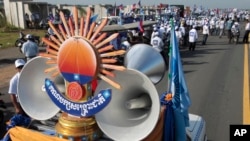Cambodian courts and police authorities have summoned a total of 140 ex-members of the opposition party in recent weeks, a local human rights group said, as government efforts to intimidate and suppress the opposition continue more than a year after the party was banned.
Dozens of former Cambodia National Rescue Party (CNRP) members have been newly ensnared in legal cases in the past month. Provincial courts summoned them on accusations that they continued to meet in violation of a Supreme Court November 2017 decision to dissolve the party and ban its members from political activities for five years.
Am Sam Ath, a monitoring manager at rights group LICADHO, said 35 ex-CNRP members were recently summoned in Battambang Province, 35 in Kampong Thom Province and 36 in Kandal Province, while authorities in Kampong Speu, Kampong Chhnang, Kampot, and Tbong Khmum provinces also summoned dozens of people.
He said the total number of summoned stood at 140 ex-CNRP members, such as former commune chiefs, commune councilors, district and provincial councilors, and members of the party’s provincial executive committees.
Last Friday, Pol Tith Theany, 49, a former CNRP financier in Kampong Chhnang Province was detained by police on charges of “providing illegal healthcare service” as he was supposedly unlicensed to provide care.
The party’s ex-leader Kem Sokha, who was arrested in September 2017, remains under house arrest in the capital. Eight leading figures of the party fled Cambodia after warrants for their arrests were issued.
One former opposition member has been imprisoned since January for criticizing the government online, while another died in unclear circumstances in prison last month after he was arrested for an old assault charge.
‘Since 1993’s national elections, the situation is the same’
Am Sam Ath said the CPP of Prime Minister Hun Sen had long relied on violence and intimidation of the opposition, even during the ostensibly democratic period that followed the 1993 Peace Accords.
“Since 1993’s national elections, the situation is the same. When the political tension took place, there would be more prosecutions and harassments [of opposition members], but those activities would end if the politicians reached a political compromise,” he said.
Phay Siphan, spokesman for the Cambodian government, defended the measures taken by the courts and police against the former opposition members. “Some of their activities could be suspected of being harmful to the national security,” he said.
United Nations Special Rapporteur for Human Rights in Cambodia, Rhona Smith, said Tuesday that she had been denied a meeting with Khem Sokha, while she expressed concern about the dozens of cases being opened against former opposition members recently.
The CNRP was banned by the long-ruling Cambodian People’s Party (CPP) National Assembly and the Supreme Court on accusations that it planned to illegally seize power with United States support – a claim the party has denied.
The court decision meant the CPP won the 2018 general elections in a vote that was strongly condemned as neither free nor fair by the U.S. and the European Union, which in past decades supported Cambodia’s weak multiparty democracy.
The U.S. and E.U. are threatening to cut off Cambodia’s preferential access to their markets as the government is violating the arrangements’ rights conditions.
The U.S. is also considering imposing conditions on new assistance to Cambodia, a visa ban on more Cambodian officials, asset freezes, opposition to all new loans and assistance from international financial institutions, and the prohibition of debt relief.




